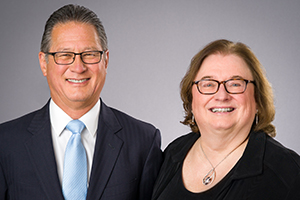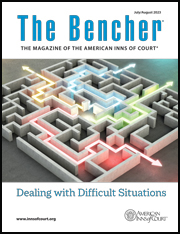Should You Forbid or Encourage the Use of Generative AI by Your Lawyers?
The Bencher | July/August 2023
By Sharon D. Nelson, Esquire, and John W. Simek

 Should you forbid or encourage the use of generative artificial intelligence (AI) by your lawyers? The answer to this question is complicated.
Should you forbid or encourage the use of generative artificial intelligence (AI) by your lawyers? The answer to this question is complicated.
Generative AI is a type of AI that uses machine learning to create various types of content, including articles, images, and audio. While there are now multiple kinds of generative AI, we are going to focus on ChatGPT, which is the AI most often used by lawyers today.
After its release in November 2022, ChatGPT had 100 million users by January 2023, making it the fastest growing app in history.
Why did so many lawyers start using ChatGPT so quickly? It was free—and if getting in was difficult because of its popularity, most lawyers were happy to pay $20/month to have premium access.
How did they use it? The list is endless, but a few common functions were:
- Legal research
- Drafting contracts
- Composing emails
- Reviewing documents drafted by lawyers for accuracy, completeness, grammatical errors, etc.
- Writing legal marketing copy
- Assessing the likelihood of success in litigation
- Drafting deposition questions
- Reviewing documents in e-discovery
Generative AI can significantly lower the time and costs of drafting a contract for lawyer review and revision. If a lawyer gives the AI a draft contract to review, using AI will lower the risk of errors and inconsistencies.
Lawyers often say that generative AI helps them to be competitive in today’s world. It is frequently predicted that lawyers who do not use AI will, very shortly, find themselves at a competitive disadvantage with attorneys who do embrace AI. Clients are quickly figuring out the advantages of employing attorneys who use AI effectively.
But there are downsides, and they can be significant, especially with respect to legal ethics.
In March 2023, ChatGPT suffered a data leak caused by an open-source bug. This is one reason why ChatGPT itself cautions users against giving it confidential data, something which we have noted that some lawyers are prone to do. The data you give it will be saved as part of a vast database and you have no say in how it will be used unless you specifically opt out.
Moreover, when a lawyer signs up to use ChatGPT, you indemnify OpenAI (the creator of ChatGPT) against being liable for any damages claimed relative to a work product of yours that utilized ChatGPT.
Here is Section 7a of the licensing agreement.
“Indemnification; Disclaimer of Warranties; Limitations on Liability: (a) Indemnity. You will defend, indemnify, and hold harmless us, our affiliates, and our personnel, from and against any claims, losses, and expenses (including attorneys’ fees) arising from or relating to your use of the Services, including your Content, products or services you develop or offer in connection with the Services, and your breach of these Terms or violation of applicable law.”
Something to consider, yes?
ChatGPT itself, in numerous conversations with us, has cautioned us about its use by lawyers. It notes that the algorithms used to generate legal documents may be biased or flawed. It notes that it may not be reliable or accurate each time it is used.
At this point, most lawyers are aware that all generative AIs suffer “hallucinations” in which they may simply make things up or produce information that is not real. As a real-life example, we have seen ChatGPT “invent” non-existent cases—a fair number of them. In answer to several questions, it gave hyperlinks; all but one of them were not active. Were they hyperlinks that had been removed from sites, or were they, like the cases, simply wrong? We can’t know.
There is much that generative AI has to offer. We use it often and are delighted with it. But we are ever and always conscious of the admonitions above!
Sharon D. Nelson, Esquire, is a practicing attorney and the president of Sensei Enterprises Inc. She is a past president of the Virginia State Bar, the Fairfax Bar Association, and the Fairfax Law Foundation. She is a co-author of 18 books published by the American Bar Association. She can be reached via email. John W. Simek is vice president of Sensei Enterprises Inc. He is a certified information systems security professional, certified ethical hacker, and a nationally known expert in the area of digital forensics. He and Nelson provide legal technology, cybersecurity, and digital forensics services from their Fairfax, Virginia, firm. He can be reached via email.